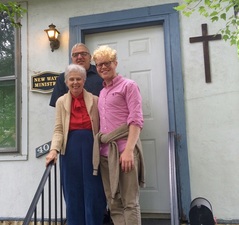 Glen (far right) with Jeannine Gramick, SL and Frank DeBernardo of New Ways Ministry. Glen (far right) with Jeannine Gramick, SL and Frank DeBernardo of New Ways Ministry. By: Glen Bradley Glen is from Kansas City, Missouri and graduated from Santa Clara University in 2016 with a Bachelor of Science in Commerce as a marketing major and English minor. This year, Glen is working at New Ways Ministry and writing for their online news journal. My past few months at New Ways Ministry have prompted me to revisit the pope’s call for Catholics to learn about mercy. With the Jubilee Year of Mercy soon to end, I have looked back on reflections from the past year with new insight from my time at New Ways Ministry. Earlier in the year, I had realized my relationship with the concept of “mercy” was complicated. I had always seen it as withholding punishment, not a spiritual gift. During the year, I saw parishes open specially marked “Doors of Mercy,” and I overheard how priests could absolve more serious sins normally left for the Papacy and special representatives to pardon. Yet I thought to myself, this form of mercy seems disingenuous with what Pope Francis asked of the church. I was witnessing the definition of mercy I had in my mind but that my heart knew to be inaccurate.
As a gay Catholic man and queer (see note below) advocate and activist, I am devoted to sharing a Catholicism that empowers rather than oppresses queer people. With regard to this Year of Mercy, I mostly heard either the familiar “love the sinner, hate the sin” rhetoric or a desire to understand queer people with no real action to do so, neither of which amount to constant contemplation or a spiritual gift. “Love the sinner, hate the sin” is not true mercy because the “love” is simply a supposed absence of hate. It implies that there is another option, to hate the sinner, and that mercy is choosing not to hate someone. So then, is God’s mercy the same: choosing not to hate the sinner? If so, then God could choose to hate us, and that possibility is what lead me to sever internalized homophobia, depression and anxiety. At the beginning of the Jubilee Year of Mercy I was hopeful for some insight into what mercy truly is, but as this liturgical year comes to a close, I began to lose hope. Before working at New Ways Ministry, I had defined mercy as not hating the sinner and not punishing sin. But I had yet to define mercy in terms of what is is. This changed during my first few months at New Ways Ministry. I began to find a new meaning for mercy in the work I did and my interactions with the staff. We did not respond to Catholic queerphobia with pure anger, and our mercy was not withholding vengeance. Instead, we lived by a different motto: “love thy neighbor as I have loved you.” This instruction from Jesus leaves out any mention of sin. It calls me, as a gay Catholic man, to give the love I have found in God to my very oppressors. Mercy is seeking closeness with everyone, whether they have sinned against me or not. This is mirrored in how New Ways Ministry functions: we minister both for the oppressed and the oppressor, seeking reconciliation between the two. We do not focus on the oppression, we focus on the pastoral needs for all sides to find God’s love in each other. Note: I use the term “queer” in place of “LGBTQ+” to communicate “gender and sexuality minorities” in a more succinct way and to follow academia (which refers to relevant theory and theology, on gender and sexuality as queer theory and queer theology, respectively). While “queer” has a history of being used as an insult, appropriate usage communicates in an affirming or self-identifying tone. Additionally, “queer,” unlike a list of letters, does not have the risk of leaving out an identity/community (e.g., “LGBTQ+” leaves out “I” for intersex and “A” for asexual, to name a few).
0 Comments
Your comment will be posted after it is approved.
Leave a Reply. |
In Their Own WordsWe invite you to get to know Loretto Volunteers and the program here. Volunteers introduce themselves and reflect on their experiences. |

